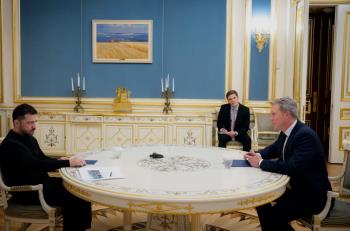Alwaght- After the last month visit to Moscow of the Russian interim President Ahmad al-Sharaa, better known for his nom de guerre Abu Mohammad al-Jolani, which looked seemingly ordinary, now the real and strategic dimensions of it are emerging.
Media reports published a few days ago show that Moscow and Damascus are preparing the ground to restore past close ties and revive Russian military presence in areas the Russians lost control over following President Bashar al-Assad’s fall last December.
In this connection, Syrian media reported that an agreement was reached between Russian and Syrian officials over Russian military deployment in southern Syria. The reports suggest that Russia is slated to resume its patrolling mission in southern regions bordering Israel and reactivate military posts along the Syrian-Israeli lines of contact. These posts during role of al-Assad has a key role in preventing tensions and sudden clashes between Damascus and Tel Aviv.
The details of a new agreement are emerging alongside a visit by a Russian military delegation to southern Syria, a visit whose specifics, including its exact timing and composition, have been deliberately kept under wraps to avoid raising alarms in Tel Aviv and Washington. A key part of the deal will see Russia bolstering defenses at its bases in Hmeimim and Tartus, using them as logistical hubs for missions in southern Syria.
Furthermore, Moscow is seeking to revive its role as a mediator between Damascus and the Alawite minority in Latakia, a role it has used in previous years to manage internal fractures in the coastal region.
Another part of the agreement mandates that Russian military advisors will train Syrian army forces, with Saudi Arabia covering the cost. Moscow's mediation between Damascus and Kurdish groups to resolve disputes is also a stipulated part of the agreement. Collectively, these developments point to a concerted Russian effort to rebuild a multi-faceted network of influence in Syria, spanning the military, political, and social spheres.
A recent phone call between Israeli Prime Minister Benjamin Netanyahu and Russian President Vladimir Putin discussed Syrian affairs, demonstrating that Tel Aviv is watching Russia's recent activities with close attention and is not indifferent to these recent Russian moves.
Before fall of the government of al-Assad, the Russians played a mediatory role between Damascus and Tel Aviv in southern parts of Syria, but after seizure of power by armed militias, the Russians fully withdrew the south. In the eyes of new Damascus rulers, the Russian return, even if in a limited way, can upend the security equations in the south.
Al-Jolani fails to check Tel Aviv
Russia's potential return cannot be divorced from Syria's precarious security situation over the past year, which has deteriorated into its most critical state due to the rise and empowerment of armed groups.
The Israeli regime has repeatedly targeted Syria over the past year, destroying a significant portion of its military infrastructure. This situation not only threatens Syria's national security and territorial integrity but has also left the interim government, which has yet to fully tighten its power grip, profoundly vulnerable. Consequently, Damascus appears to have concluded that without relying on a foreign power, it lacks the ability to establish an effective deterrent against the Israeli regime.
Al-Jolani had hoped that by signing a security agreement with the Israeli regime, he could halt the attacks and bolster his domestic legitimacy. His trip to Washington and meeting with Donald Trump were efforts in the same direction, but the outcome of recent developments indicates his attempts have been unsuccessful.
A primary reason for this failure was the conflicting interests between Washington and Damascus. As a close ally of the occupying regime, the US applied virtually no pressure on Netanyahu's government, and its positions were largely favorable to the Israelis. Furthermore, Donald Trump's notably cold reception of al-Jolani at the White House demonstrated that the political promises from Washington were overly vague and hollow, and could not be taken seriously.
The field presence of senior Israeli military and political officials in the occupied regions in southern Syria and ongoing attacks on Syrian territory shows that neither Tel Aviv nor Washington are planning to grant any points to Damascus to strengthen al-Jolani's rule.
In such conditions, the new Syrian president has his eyes on the Russian presence, hoping that it will establish a kind of balance in the face of the Israeli enemy. This approach rests on the past experience, when the Russian military forces in the south managed to de-escalate the tensions.
This expectation comes as security negotiations between the interim government and Tel Aviv, which were intended to lead to a reduction in enemy attacks, have stalled due to the excessive demands of the Israelis. In this difficult situation, al-Jolani is hoping that Moscow, by stepping in, can resolve some of the security issues and bring a degree of stability to Syria.
Even Russia cannot push Israel back
A look of the current regional situation compared to the past reveals a fundamentally altered landscape, where relying on foreign powers to resolve issues has proven exceedingly difficult in practice. So, even Russia is unlikely to provide meaningful assistance to Damascus under the present turbulent conditions for several key reasons.
First, Netanyahu's hardline cabinet views the region's security crises as a golden opportunity to advance its expansionist agenda. Hardline ministers believe that amid the war in Gaza and the instability in Lebanon and Syria, they can escalate military and security pressure to expand the strategic depth of the occupied territories. Therefore, even a Russian presence is unlikely to deter such a radical government, as the ideological drivers and long-term expansionist goals of Netanyahu transcend traditional deterrence calculations.
Second, the protracted war in Ukraine and the complexities of Moscow's relationship with the Israeli regime, including disagreements over Tel Aviv's support for Kiev, have weakened the political and military leverage Moscow can use to pressure Tel Aviv. Thus, in this fragile environment, Russia is compelled to limit its presence in Syria to specific, low-cost missions to avoid being drawn into a new crisis.
Furthermore, the US and its allies will not permit a resurgence of Russian influence in Syria to its former levels. Over the 13 years of Syria's civil war, a consistent objective for Washington and its allies has been to curtail Russian sway in this country. Now, with the Ukraine conflict at its peak, it is logical that the US would seize the current opportunity to block Russia's re-emergence as a power in West Asia. The push to establish a military base in Damascus itself demonstrates that Washington considers countering Russian movements a security priority. One of the key functions of these bases is precisely to monitor Russian military activities in Syria, preventing Moscow from re-establishing itself as the dominant actor in the country.
Given these, the new Syrian president cannot seriously count on Moscow to weather the current security crises. Odds are that Russian return would once again make Syria a wrestling ground for the West and East amid burgeoning Russian-American competition.
Therefore, the Russian return to Syria's south may be a tactical success in the eyes of al-Jolani, but given Moscow's effective limits and growing American and Israeli pressures and complicated structure of Syrian crisis, the Syrian threat of pivot to Russia cannot work to dissuade the Israelis from expanding their occupation or to persuade the White House to make a move in Damascus favor.



























